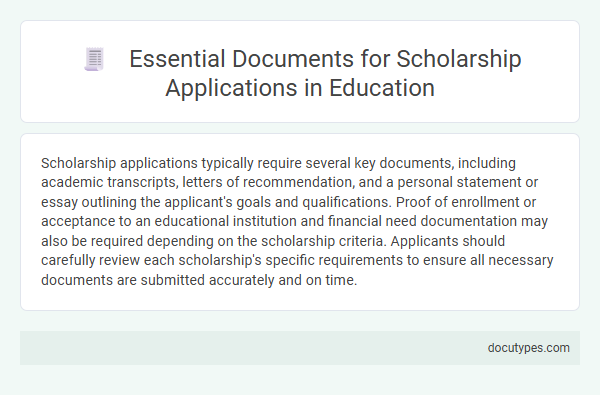Scholarship applications typically require several key documents, including academic transcripts, letters of recommendation, and a personal statement or essay outlining the applicant's goals and qualifications. Proof of enrollment or acceptance to an educational institution and financial need documentation may also be required depending on the scholarship criteria. Applicants should carefully review each scholarship's specific requirements to ensure all necessary documents are submitted accurately and on time.
Introduction to Scholarship Application Requirements
Scholarship applications require specific documents to verify eligibility and academic achievements. Understanding these requirements is essential for a successful submission.
Commonly requested documents include academic transcripts, letters of recommendation, and personal statements. Financial information or proof of enrollment may also be necessary depending on the scholarship's criteria.
Importance of Proper Documentation
| Document Type | Description | Importance |
|---|---|---|
| Academic Transcripts | Official records showcasing a student's grades and academic achievements. | Verify scholastic performance, essential for merit-based scholarships. |
| Letters of Recommendation | Endorsements from teachers, mentors, or employers highlighting the applicant's skills and character. | Provide credibility and support personal qualities beyond academic scores. |
| Personal Statement or Essay | Written narrative expressing the applicant's motivation, goals, and suitability for the scholarship. | Demonstrates communication skills and unique qualifications. |
| Proof of Identity | Government-issued ID or passport confirming the applicant's identity. | Ensures legitimate application and prevents fraud. |
| Financial Documents | Income statements, tax returns, or financial aid forms indicating economic need. | Supports applications for need-based scholarships by verifying financial status. |
| Certification of Extracurricular Activities | Records or certificates proving participation in community service, sports, or clubs. | Highlights leadership skills and well-roundedness valued by many scholarships. |
| Resume or Curriculum Vitae (CV) | Detailed list of academic achievements, work experience, and relevant activities. | Offers a comprehensive overview of the applicant's qualifications. |
| Proper Documentation | Complete, accurate, and well-organized documents submitted on time. | Increases chances of approval by reflecting professionalism and attention to detail. |
Academic Transcripts and Certificates
Academic transcripts and certificates are essential documents submitted for scholarship applications. These records validate a student's educational background and achievements.
Academic transcripts provide a detailed account of courses completed, grades obtained, and overall academic performance. Certificates highlight specific accomplishments, such as awards, honors, or participation in extracurricular activities. Both documents help scholarship committees assess the eligibility and merit of applicants.
Personal Statement or Motivation Letter
One of the key documents submitted for scholarship applications is the Personal Statement or Motivation Letter. This document provides insight into your background, goals, and reasons for applying.
- Personal Statement - A narrative that highlights your academic achievements, experiences, and future ambitions.
- Motivation Letter - A focused explanation of why you are interested in the scholarship and how it aligns with your career objectives.
- Purpose - To demonstrate your commitment, passion, and suitability for the scholarship selection committee.
Letters of Recommendation
What role do Letters of Recommendation play in scholarship applications?
Letters of Recommendation provide insight into the applicant's character, achievements, and potential from the perspective of educators or professionals. Scholarship committees rely on these letters to assess qualities that transcripts and test scores cannot fully capture.
Proof of Financial Need
Scholarship applications often require documentation to verify the applicant's financial need. Proof of financial need typically includes official documents that demonstrate the applicant's economic situation.
Common documents submitted include family income statements, tax returns, and bank statements. Some scholarships may also request proof of government assistance or letters from social services.
Identification and Citizenship Documents
Identification and citizenship documents are essential for verifying scholarship applicants' eligibility and nationality. These documents ensure that candidates meet the institution's requirements and comply with legal standards.
- Passport - A government-issued document used to confirm the applicant's identity and citizenship status internationally.
- Birth Certificate - An official record proving the applicant's place and date of birth, often required to establish citizenship.
- National Identification Card - A valid ID card issued by the country's government confirming the applicant's identity and citizenship.
Providing accurate identification and citizenship documents is crucial for a successful scholarship application process.
Standardized Test Scores
Standardized test scores are a critical component of scholarship applications, providing a measurable indicator of academic ability. These scores, often from exams like the SAT, ACT, GRE, or TOEFL, help scholarship committees evaluate candidates fairly. Ensure you submit official test score reports directly from the testing agency to meet scholarship requirements.
Curriculum Vitae or Resume
A Curriculum Vitae (CV) or Resume is a crucial document submitted for scholarship applications, showcasing the applicant's academic achievements, work experience, and extracurricular activities. It provides scholarship committees with a detailed overview of the candidate's qualifications and skills relevant to the scholarship criteria. Including a well-structured CV or Resume increases the chances of securing financial aid by highlighting strengths and accomplishments effectively.
What Documents Are Submitted for Scholarship Applications? Infographic

